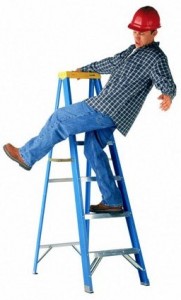 Ladders are tools. Many of the basic safety rules that apply to most tools also apply to the safe use of a ladder:
Ladders are tools. Many of the basic safety rules that apply to most tools also apply to the safe use of a ladder:
- If you feel tired or dizzy, or are prone to losing your balance, stay off the ladder.
- Do not use ladders in high winds or storms.
- Wear clean slip-resistant shoes. Shoes with leather soles are not appropriate for ladder use since they are not considered sufficiently slip-resistant.
- Before using a ladder, inspect it to confirm it is in good working condition.
- Ladders with loose or missing parts must be rejected.
- Rickety ladders that sway or lean to the side must be rejected.
- The ladder you select must be the right size for the job
- The Duty Rating of the ladder must be greater that the total weight of the climber, tools, supplies, and other objects placed upon the ladder.
- The length of the ladder must be sufficient so that the climber does not have to stand on the top rung or step.
- When the ladder is set-up for use, it must be placed on firm level ground and without any type of slippery condition present at either the base or top support points.
- Only one person at a time is permitted on a ladder unless the ladder is specifically designed for more than one climber (such as a Trestle Ladder).
- Ladders must not be placed in front of closed doors that can open toward the ladder. The door must be blocked open, locked, or guarded.
- Read the safety information labels on the ladder.
- The on-product safety information is specific to the particular type of ladder on which it appears. The climber is not considered qualified or adequately trained to use the ladder until familiar with this information.
- Never jump or slide down from a ladder or climb more than one rung/step at a time.
via basic ladder safety.
